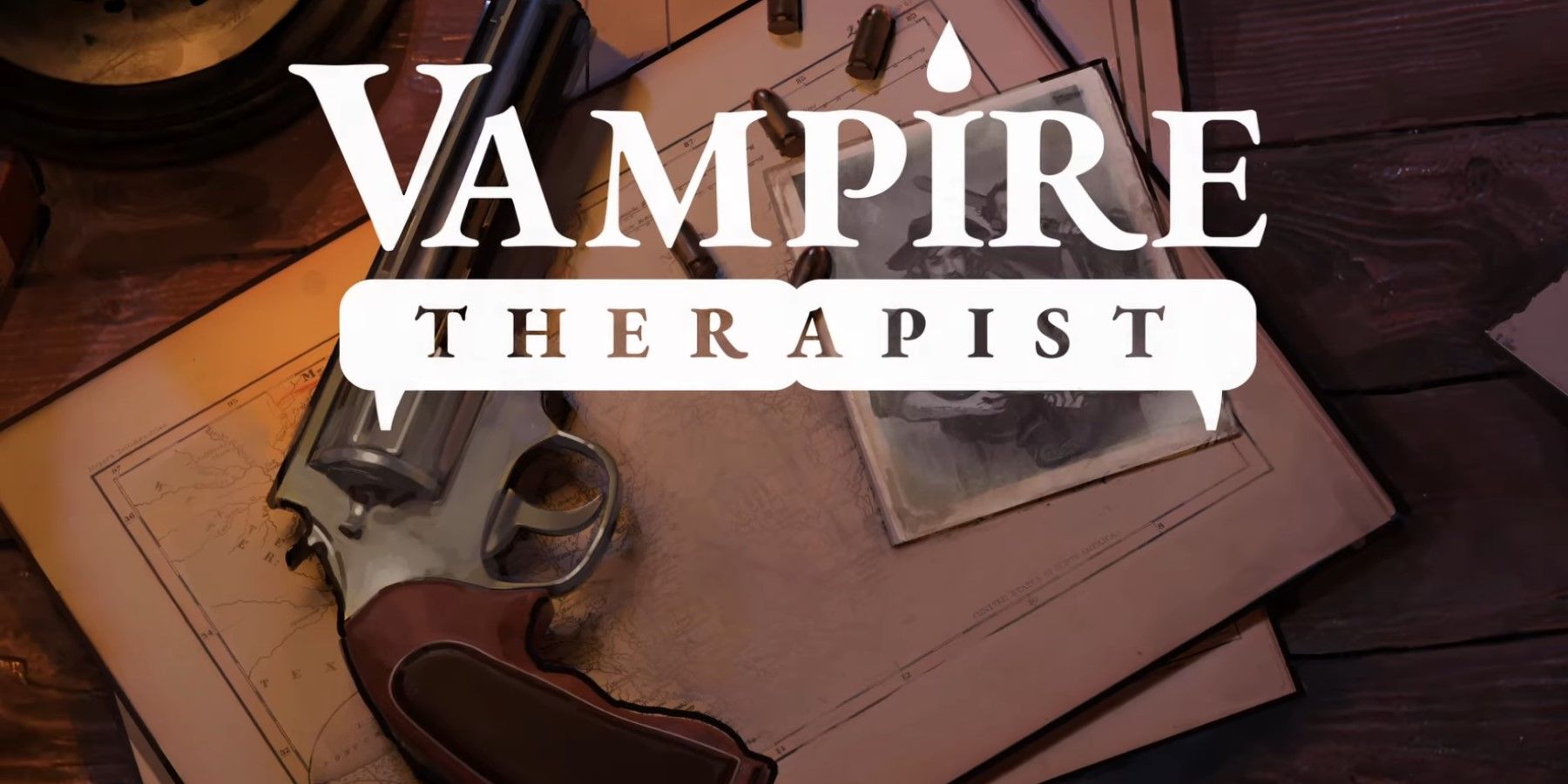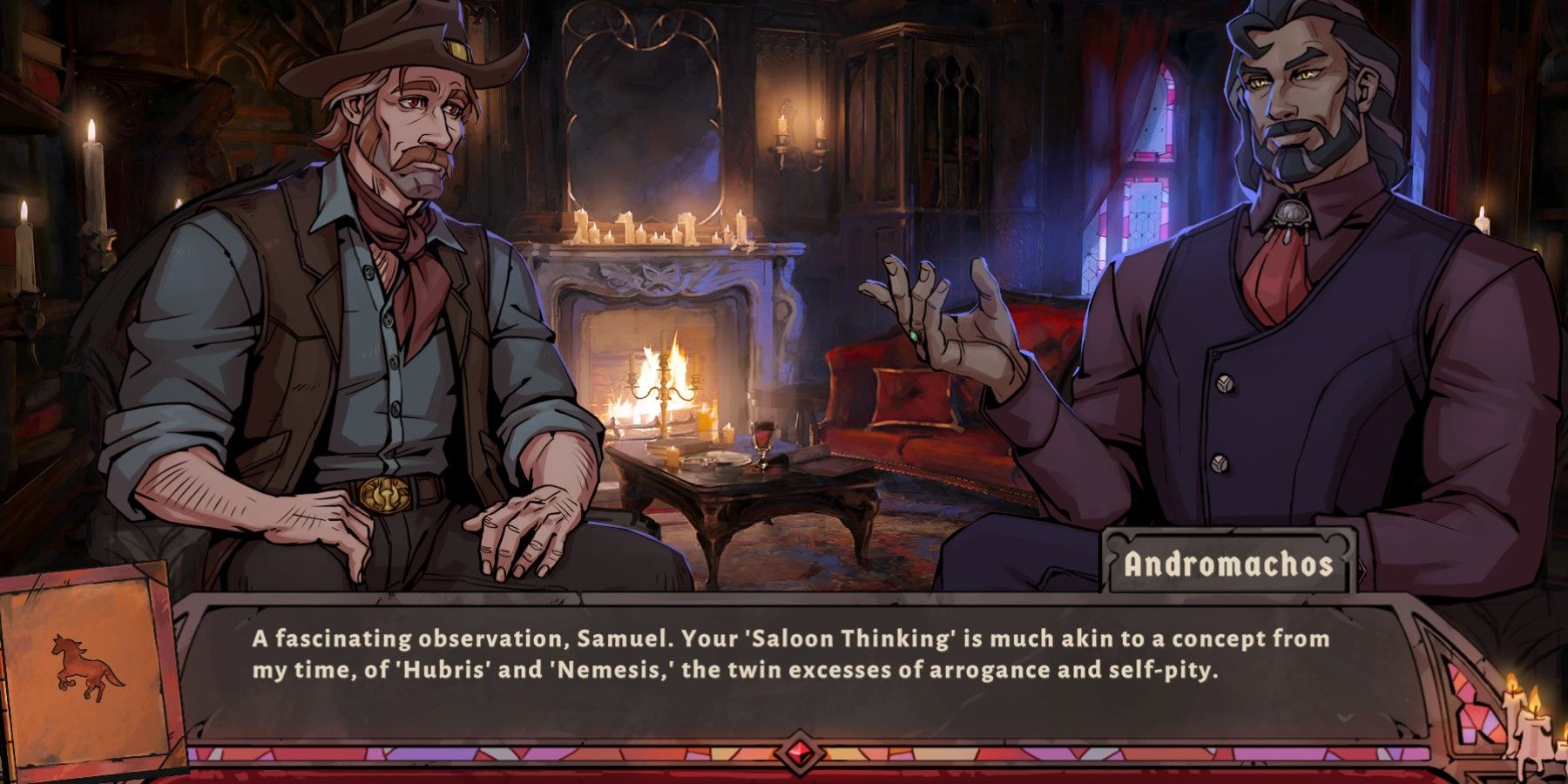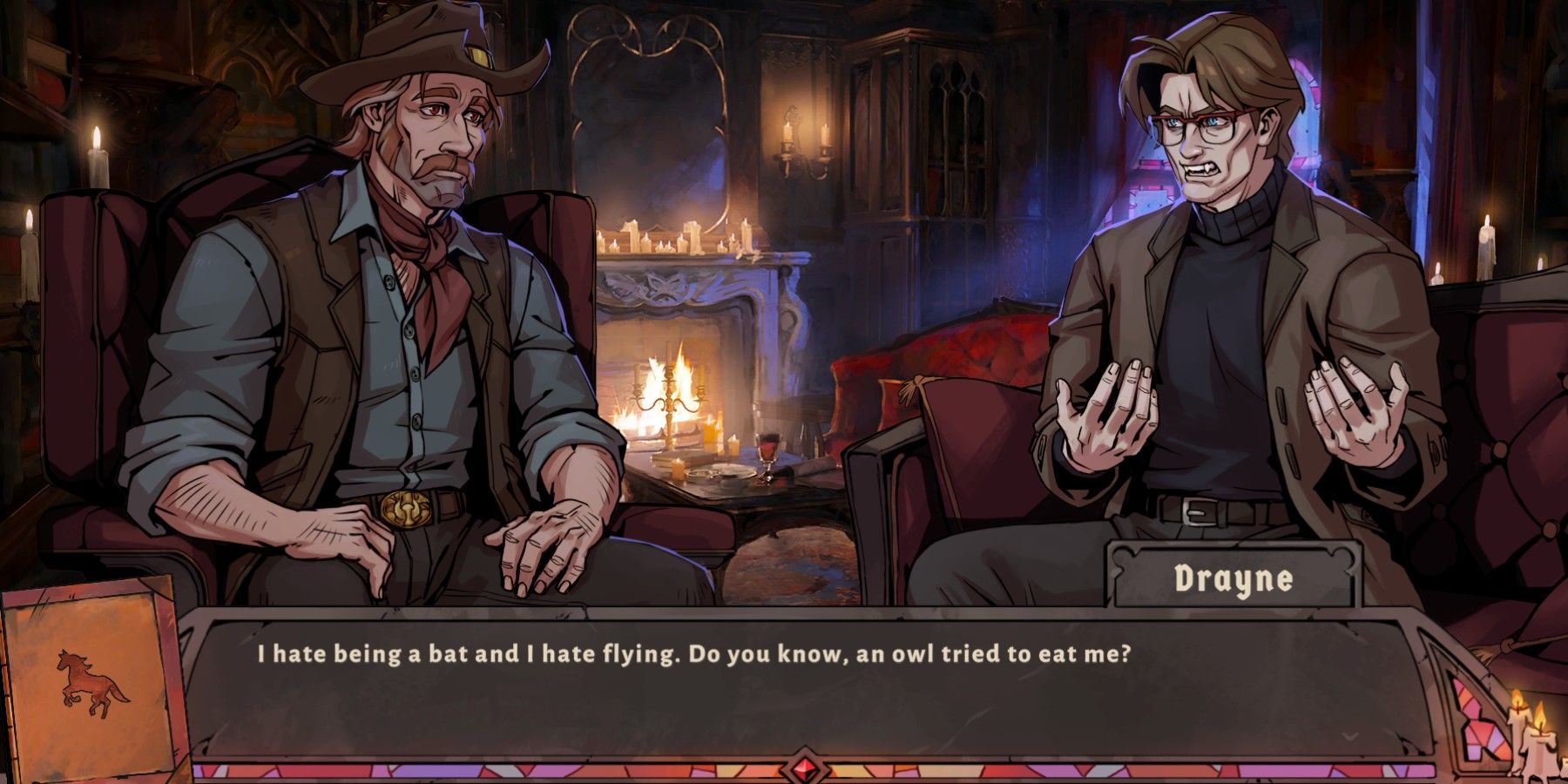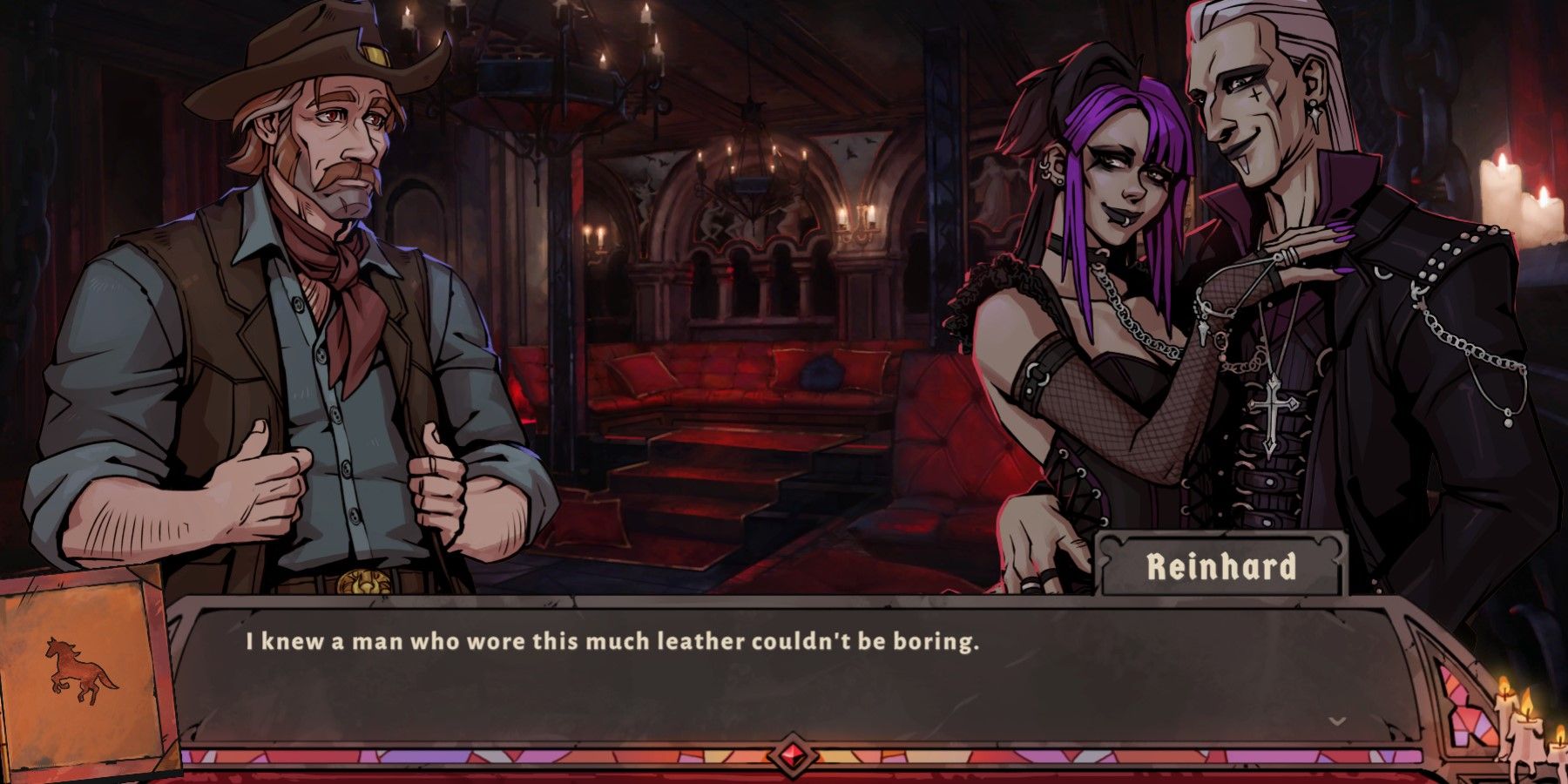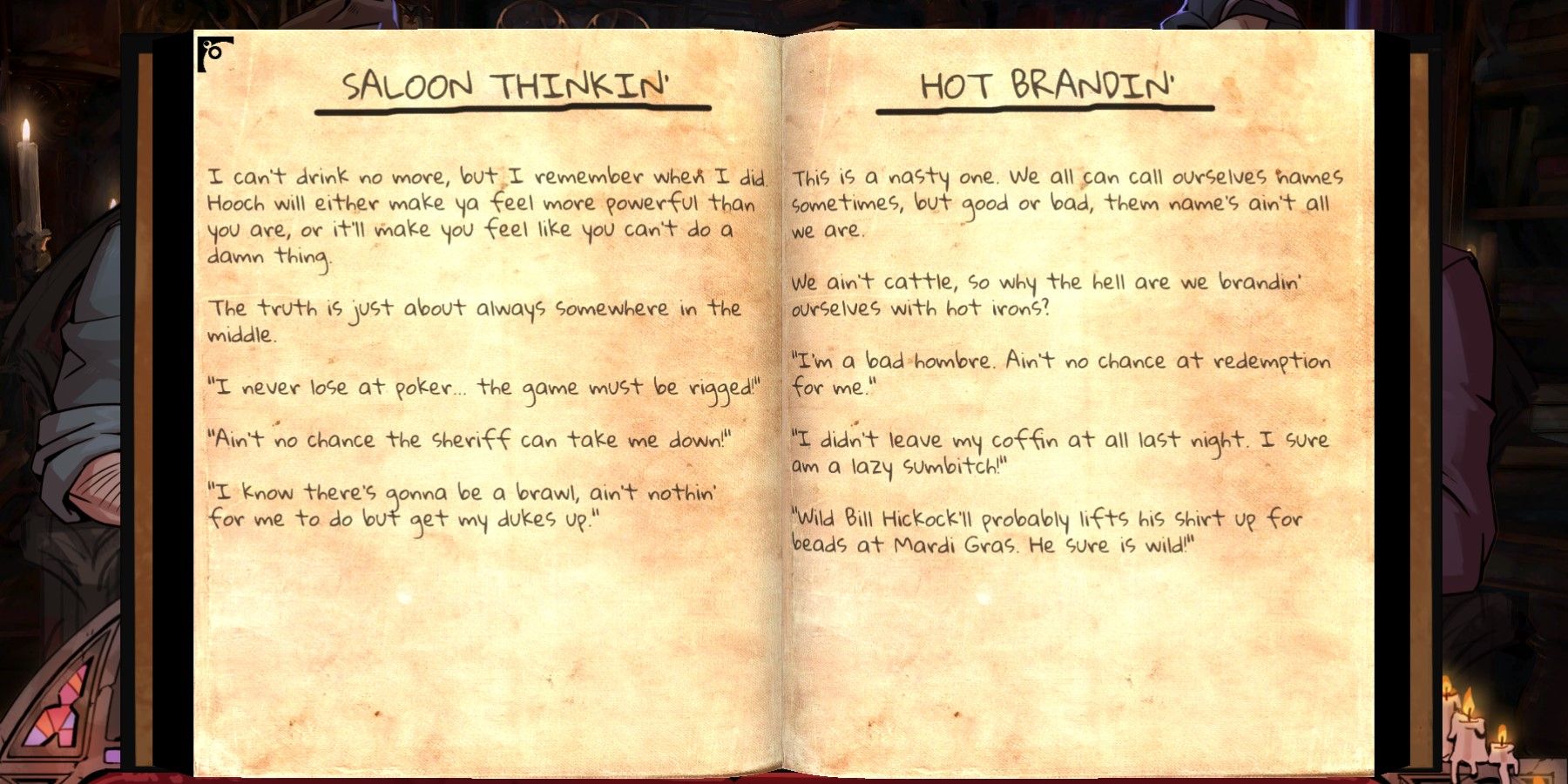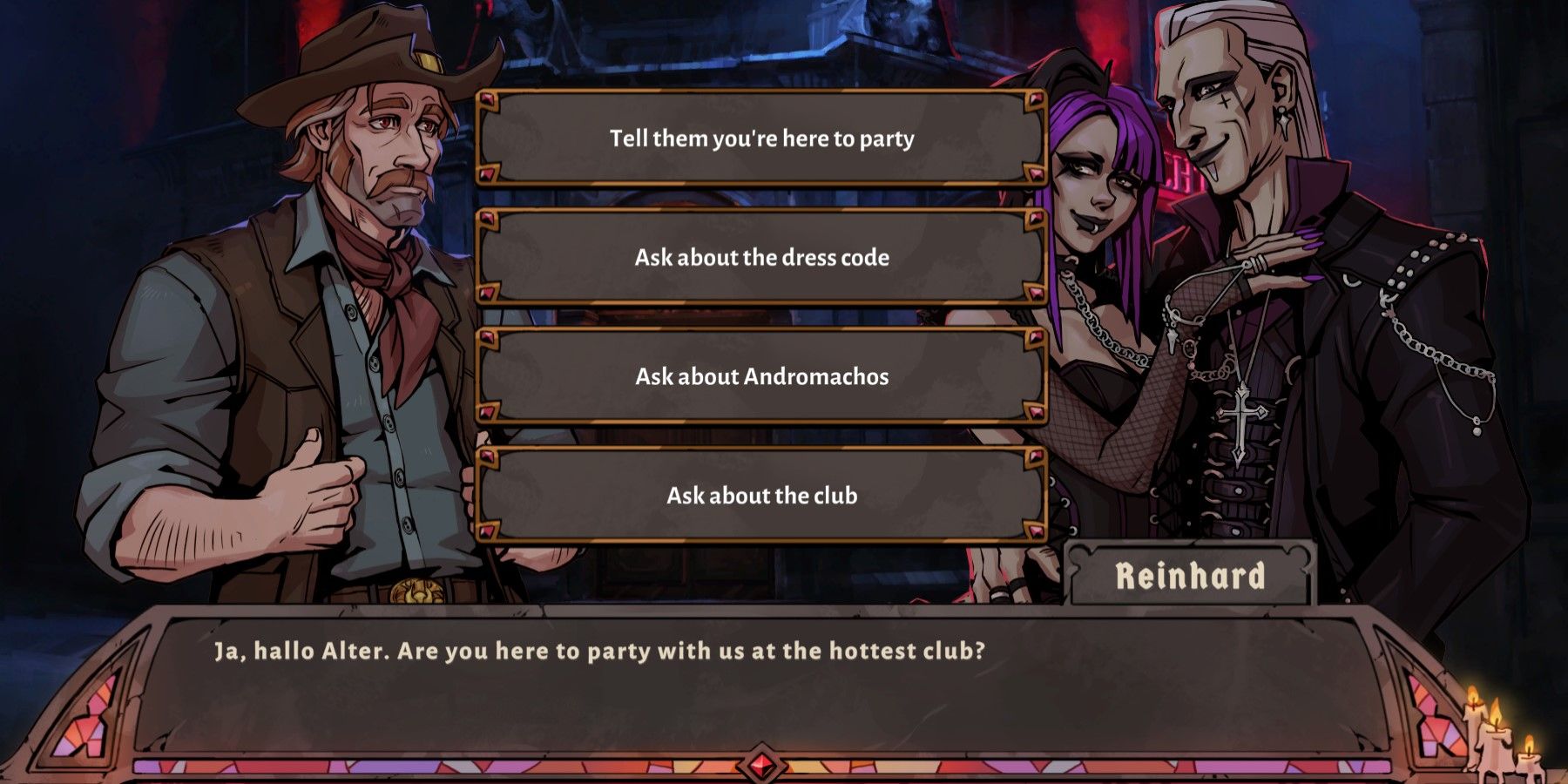Highlights
- Vampire Therapist explores the mental health issues faced by vampires, acknowledging that immortality isn't easy and goes beyond the glamorous portrayals in vampire fiction.
- The game utilizes vampires as historical creatures to address modern mental health issues, highlighting that our brains work the same way in terms of neurochemistry and the same existential fears affect us all.
- The protagonist, Sam, is a cowboy who goes through a journey of self-discovery and mindfulness, serving as both the client and therapist in the game, and learning about cognitive distortions while helping his vampire clients.
Vampires in fiction have been many things: sinister villains, romantic heroes and heroines, and even educational figures who teach children about numbers. But the one thing vampires haven't done is go to therapy. Upcoming title Vampire Therapist aims to address that, starring a vampire who helps other vampires through their various cognitive distortions. Vampire Therapist acknowledges that immortal life isn't easy, and is far more than the glamorous mystery much vampire fiction portrays.
Game ZXC sat down with Cyrus Nemati, founder of Little Bat Games and developer of Vampire Therapist, to talk all about the 2024 "analyze-em-up" game. Nemati spoke about the various mental health elements Vampire Therapist explores, what he learned from his time playing the roles of Theseus, Dionysus, and Ares in Hades, and which famous vampires he would send to therapy if he had the opportunity. The following transcript was edited for brevity and clarity.
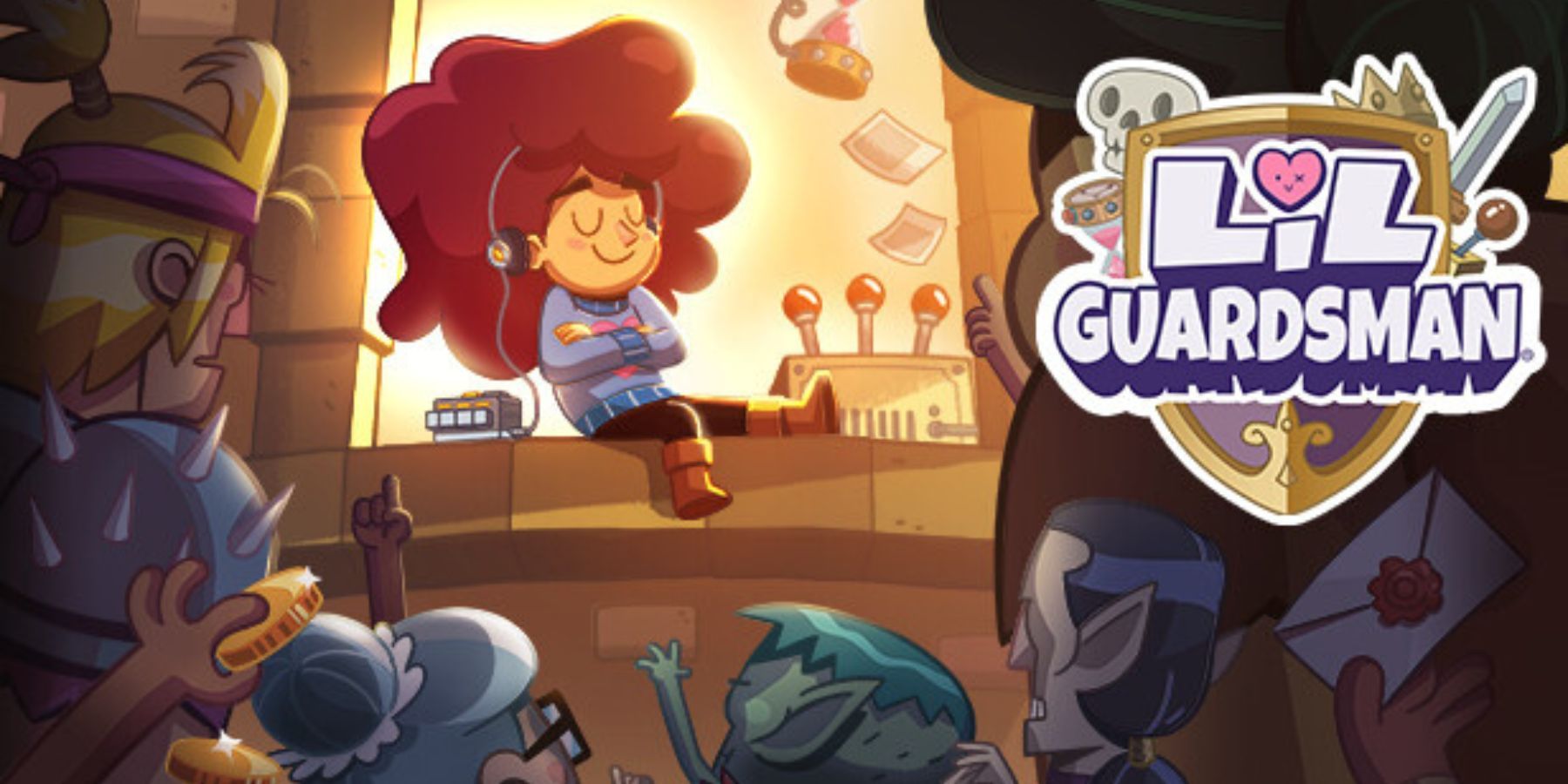
Lil' Guardsman Interview: Co-Founders Detail Time-Travel Mechanics, Cartoon Inspirations, and More
In a Game ZXC interview, Lil' Guardsman's co-founders explain its time-travel mechanics, cartoon inspiration, and more.
Q: Where did the idea come from, to send vampires to therapy?
Nemati: Well, I mean, it came from some kitchen conversations. But largely, it came from Twilight. There's the scene in the Twilight movie where Edward Cullen sits down and he starts playing the piano, and he's been alive for 200 years. And you're supposed to think, oh, wow, he's really good. He's been playing for 200 years. But it's not that good. And then I thought, why should it be good? You know, that's a lot of pressure on a vampire. Just because you have 200 years to do something, doesn't mean you should do it. And then what kind of pressures does a vampire put on themselves? Because there's no reason why a vampire can't go to Mars, or why they can't go to the bottom of the sea, or anything that takes a really long time. Vampires can do it. That's a lot of pressure. And really, it sprang from that idea, of "why does he have to play Rachmaninoff?"
Q: Oh yeah, Edward Cullen definitely needs therapy.
Nemati: So much therapy. This stuff builds up over time. It doesn't lessen. I make a joke about dating mortal high schoolers, that's in the game.
Q: You describe vampires as "the perfect vehicle for exploring mental health." Could you talk a bit more about that?
Nemati: The nice thing about vampires is that they're historical creatures. By nature, we've only been talking about mental health for the past around 170 years. So this is a fairly new occurrence. But vampires have been around a long time. And the same issues that they would have are the issues that we have now. They manifest differently. We live in a modern world with very modern problems. But our brain actually works the same way in terms of neurochemistry. The same feeling that we get if a lion is chasing us, we get if our boss is chewing us out. It's not the same, but still, we get that existential fear that comes in that ends up being the reason for doing a lot of the things that we do.
Q: And vampires have been around for a long time, so they've experienced that more than most?
Nemati: Yeah! We go as far back as 3000 years for the guy who is teaching you the therapy basics. We have a vampire from the Bronze Age. Then we have a big jump to my period of historical interest. So, the 16th, 17th, 18th centuries and, of course, 19th for the protagonist.
Q: What are some of the mental health issues your vampire clients are facing in the game?
Nemati: So, I have an agoraphobic vampire who has learned that staying home is the safest thing to do. So they don't like to leave the house at all. I have a narcissistic vampire who changed the field of acting in the late 18th century. So he's got those issues. And then I've got the more conventional human issues. Like, going back to Edward Cullen, and should he be playing the piano? Well, I have somebody that was learning to be a doctor in the early 17th century. And he thinks that he should be able to come up with a synthetic blood, right? This is a big part of his character. These are big pressures that we put on ourselves. So yeah, I tried to have a pretty broad spectrum of things. The main character is really all about guilt - about leaving his family behind, about losing his horse. I lost my cat last year and haven't gotten over it. So I have this whole arc about guilt and moving on. The general theme of the game is compassion - self-compassion, compassion for others, and how to get there.
Q: What was it like working with licensed therapists during the development of Vampire Therapist?
Nemati: Well, [the therapists] actually took it as something really interesting. It's a way to look at therapy from a different perspective and make it accessible to a broader audience. When I went to them, I had that general mechanic already thought of in my head, and I went to them to validate this idea. And there was a lot of back and forth around what does this particular [cognitive] distortion mean, specifically. Even now, I'm not quite done with the story yet. So it's been an iterative process, but they've been excited about actually being able to turn it into something that is easier to internalize. I've had a lot of therapy myself. And I've been aware of a lot of these terms, but only by using them consistently in both playing and developing this game, do I finally understand it. Oh, I'm putting this "should statement" on myself? Or, I've got a control fallacy? So it's been really enlightening. It's one thing to learn the terms, but once you start applying them, then you can start really looking at your own thoughts and saying, oh, wait a minute, is this reality? Or is this an emotional response?
Q: Tell us some more about Sam, your protagonist. What kind of guy is he?
Nemati: So Sam is a cowboy born in the early 19th century. And he goes through this journey. He used to be in a gang. He was a pretty awful fellow. Caused a lot of ghost towns out west. But when he was on the run, he fell in with some 19th century American Transcendentalists. It was kind of accidental that I found these groups. They're really interesting to go into, because they were basically teaching each other about mindfulness, before we ever had a conception for it. So Sam became a really nice vehicle for exploring the concept of thinking about oneself. He has a whole part of his life where he is roaming America's national parks and just taking in nature and understanding it, and having a broader idea of what it means to be a human animal. So he was a really nice tutorial character for players, because he's learning these things about himself as the player is.
Q: So Sam gets to be both the client and the therapist?
Nemati: Exactly! When you [Sam] receive therapy in the game, those are the tutorial parts where you're learning about different types of distortions while going through your own issues as the main character. Then, he gets to apply the things he's learned in the therapy sessions with his clients. He's come up with some of it. He'd accidentally come up upon the idea of cognitive distortions on his own while walking in the woods for nine years. But, he gets it formalized by having a teacher. Well, just a little disclaimer - pseudo-formalized, because again, these are vampires, and they have much different psychosocial concerns than we do.
Q: Andromachos, the therapy mentor, is a fascinating character. What's he like?
Nemati: 3000 years old. Ancient Greek. I wanted someone who had really done everything in a negative sense - a really, really bad fellow. And if you go back far enough, you know, anything was really acceptable. And this guy did it for a really long time. Doing horrible things and finding no contentment, no excitement or joy, no satisfaction. So I wanted him to have to go through this dark journey himself to get to the point where he was able to become more enlightened. He just walks into the ocean one day, and he keeps on going, and he sees what there is to see in a world that he's never seen before. Then he gets the idea that there is more to life and starts examining philosophy and psychology and the human condition. So yeah, I wanted a character who had really just been through everything and come out on the other side changed.
Q: I love his look. He's very handsome.
Nemati: Oh, that was by design! There's some artwork we'll be sharing in the coming months that we hope will make him quite meme-able. We hope to see new vampire memes and fan art too!
Q: And there are plenty of other vampires who Sam takes on as clients - what can you tell us about them?
Nemati: Yeah, I'll be revealing a little bit more about them in the upcoming months. But I will say that I have a woman from the Italian Renaissance based on a real historical character. I've actually been working with her Chief Historian, and she is a very powerful lady. And it's such an interesting character with such a colorful history that hasn't really been looked into much. I have a narcissist. He is from late 18th century England. He found his way out of the slums, and he's got this sense of desperation about it. I have the 17th century doctor character. He was a student of William Harvey, who was the guy who mapped the circulatory system. [Harvey] was able to show students how a dead pigeon's heart could be stimulated to beat again by touching it with a bit of saliva. So I got this idea that he's showing that there is life beyond death, and this will probably inspire one of his students, and one of his students is, indeed, the first client in the game.
Q: A vampire interested in the science of blood is fascinating.
Nemati: Exactly! I've tried to do my due diligence in terms of the science behind these things. I mean, most of it is pseudoscience that's supposed to sound really smart. But you know, I have a section in the game where you're biting other vampires, or biting mortals' necks without trying to kill them. So the interior jugular vein is the place where you want to bite to get the best flow without killing someone. So I know that now, and now that's in the game!
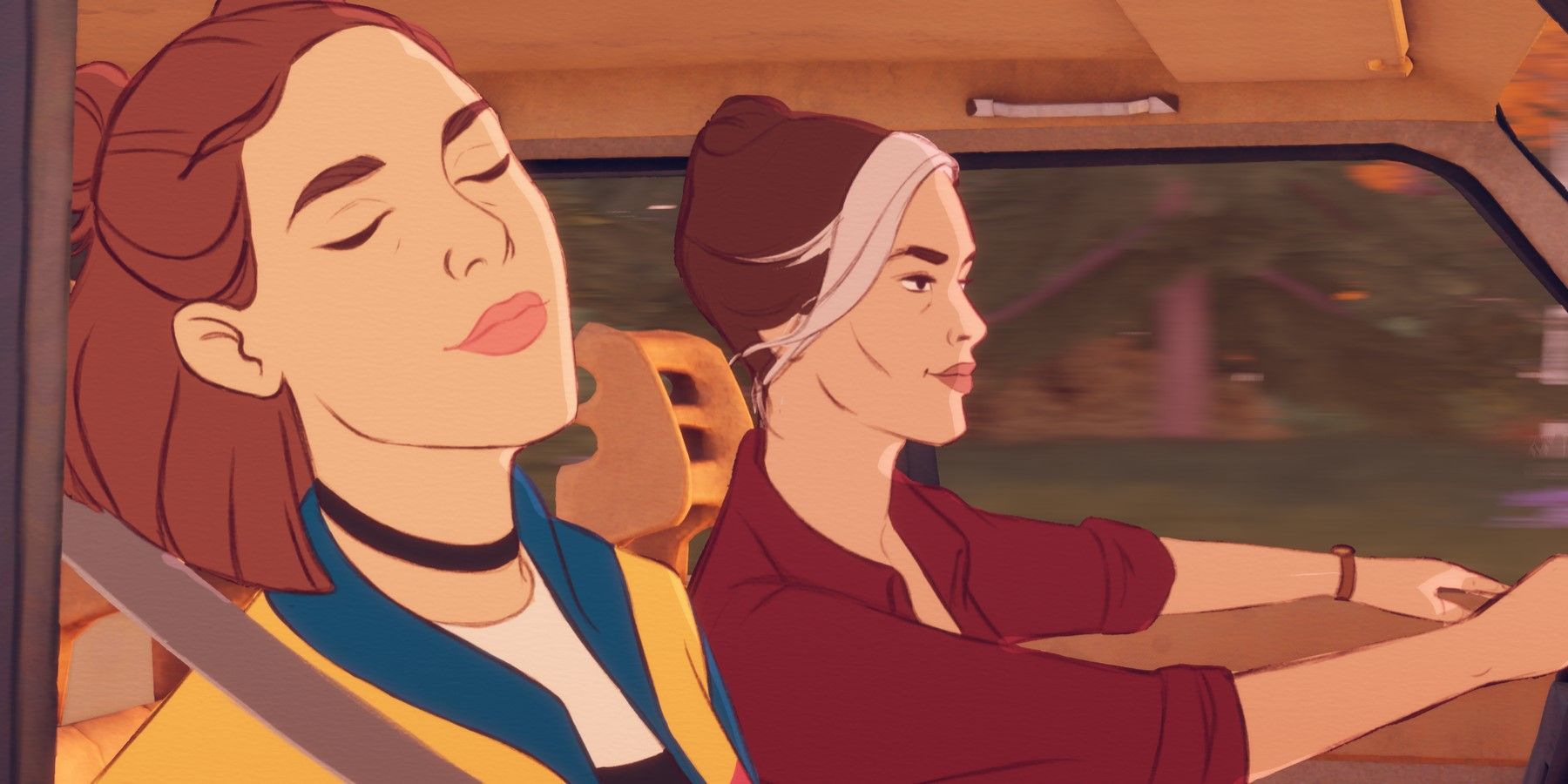
Open Roads Interview: Team Talks Road Trip Fun, 2000s Nostalgia, And More
Game ZXC talks to the Open Roads studio about the development of its upcoming road trip mystery game and the mother-daughter story at its center.
Q: What was writing the dialogue for these many different vampire characters like?
Nemati: Well, it's funny. The starting point is less smart than it sounds. Usually I come into it with: I want to tell a joke. I want to tell a good joke. And I say, How do I get to the punchline? What does this character require? And then I end up stumbling upon these perfect matches. I'm able to go into their history and find inspiration from it. In the case of this Italian Renaissance character, she's had 20,000 of her letters published and translated. I read all of them, and I was able to get her voice really well and go into her experience, and have it fuel the humor. You know, the fact that she is so strong, that she wants to control everything. It's used for humorous effect. But really, it's to get to the jokes. Like, how can I get there and make that punchline hit as hard as it possibly can?
Q: What would you say are some of the inspirations behind the humor in Vampire Therapist?
Nemati: I enjoy a lot of British humor. Horrible Histories is an amazing show. A lot of Americans haven't seen it, but their humor is really similar to what I'm doing. They're looking at history and taking a modern perspective on it. Of course, Monty Python and What We Do in the Shadows. I grew up with Mr. Show, which taught me about recognizing the absurdities in modern life, and then just accepting them as much as possible and really blowing them up. That's the cool thing about doing a game about mental health. We do a lot of ridiculous things and believe a lot of ridiculous things just because we've been doing it for a long time, even if they hurt us. So this kind of magnifies those things and makes fun of them.
Q: Using humor to introduce some really intense topics?
Nemati: Oh, yeah, absolutely. I find that history diffuses a lot of the more difficult parts to process. If something happened 400 years ago, we can say, oh yeah, that was a long time ago. And I'm able to talk about things that wouldn't be able to be talked about otherwise. Things that were commonplace in history that aren't so commonplace now.
Q: Vampire Therapist is coming out at such a great time. Vampires are so hot right now.
Nemati: There are cycles. I've actually mapped it! It's about every ten years - vampire trends go up, then down, then back up again. And right now, we're at the peak. But vampires have always been with us. My mom loves vampires. She watched Dark Shadows back in the 50s. Vampires are meant to be titillating creatures, so they really appeal to us.
Q: Yeah, there are so many great vampires from throughout history. If you could pick any vampires from literature or film to include in Vampire Therapist, who would it be?
Nemati: Well, Dracula never had a lot of characterization, so not him. What about Edward from Twilight? Not that I love Edward from Twilight. But like, what the hell is his deal? Why is he going to high school? What does he have in common with somebody who has only roamed this earth for 18 years? What drives him to do that? You know, this is something that I would love to explore and absolutely tear down.
Q: And what about vampires from video games? Who would you include?
Nemati: Definitely Astarion [from Baldur's Gate 3.] I love Astarion, deeply. I am an actor at heart. I'm an actor that loves to make fun of actors. And Astarion is perfect. He's somebody really over the top. Who can just dance the dance. I have a character in this game that's from the mid-Shakespearean period - 1798. He's the guy who transformed Shakespearean acting into something that was less pantomime and more serious acting. That character is in this really over-the-top place, and Astarion's in the same place. I actually thought about reaching out to [Neil Newbon] about casting for that role.
Q: I'd play an Astarion DLC!
Nemati: I'd love to do DLC. One idea I have is couples' therapy.
Q: Vampire-vampire or human-vampire couples?
Nemati: Vampire-vampire! Only! The mortal thing - I'm not touching that. That's not for me. Let someone else handle that.
Q: What can you tell us about Vampire Therapist's take on vampire-vampire romance?
Nemati: It draws a lot from What We Do In The Shadows and the romances there - some of the romantic issues they have. And it's going to come from questions like: How was the vampire made? How old are they? What was their place? What are the things that they have in common? And what are the things that are so alien from their experiences, because, if you separate things by a few generations, you're going to have misaligned viewpoints with vampires. So there's just a lot of comedy to plumb there.
Q: In terms of voice acting, you voice several of the characters in Vampire Therapist, is that correct?
Nemati: I'm many characters in the game. This was my opportunity to voice characters that I've always wanted to do. For example, the Jekyll and Hyde type character is something that's really disappeared from the cultural consciousness. So I wanted to have a character like that. I love Theseus [from Hades]. So I wanted to have a very "actor-y" character. And, playing Sam, this is strangely the first game where I'm doing an American accent. Despite being American myself. I always get cast in British roles, or German roles. So this was something nice and different for me to do. I'm also doing Andromachos. It's got some pitch shifting and a Greek accent. I'm playing some minor roles too. Like the bouncer - he can barely speak any words of any modern tongue, so it's mostly just grunting. That's easy for me to do!
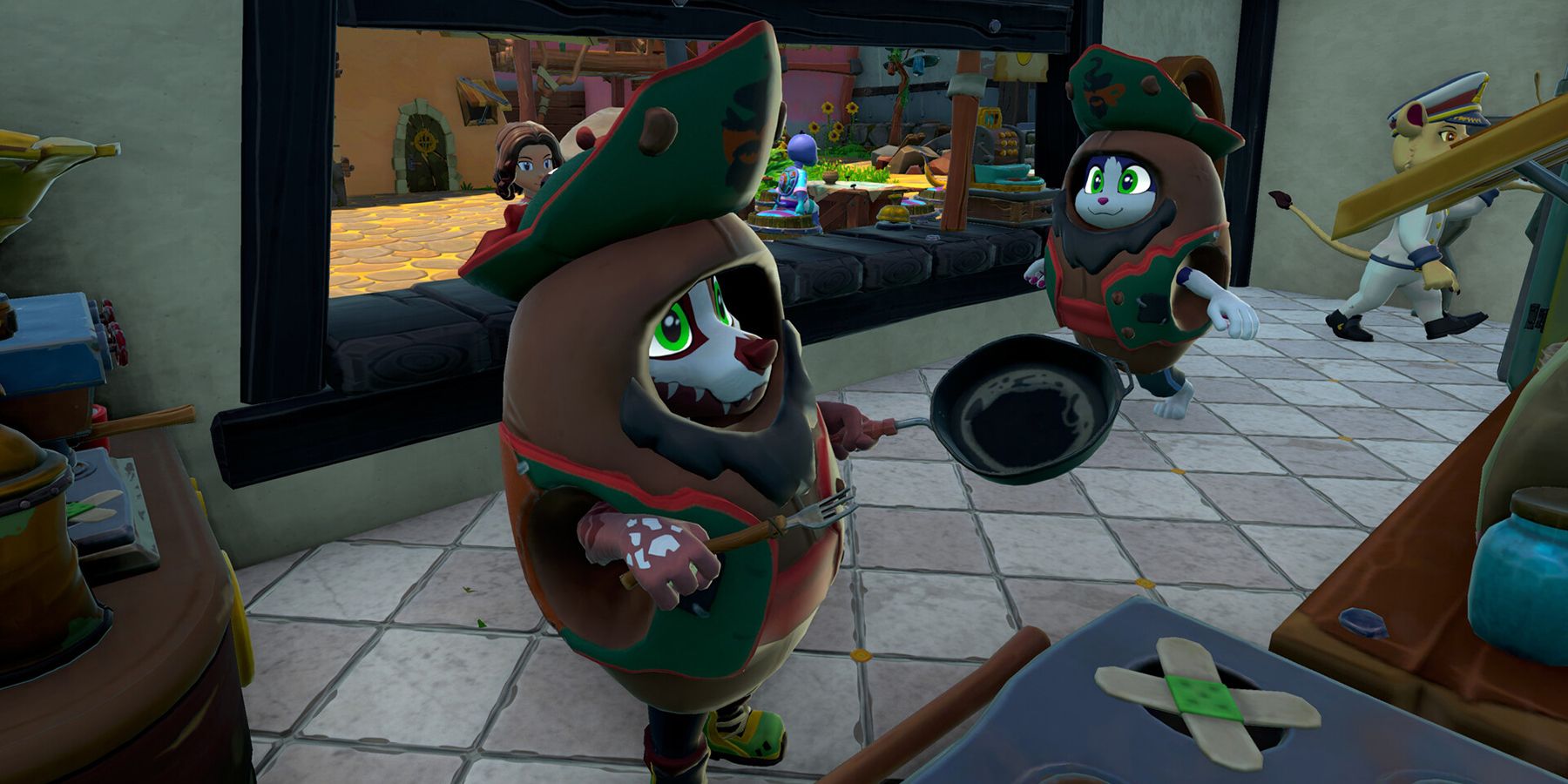
Critter Cove Interview: Devs Detail How Their 'Cozy Post-Apocalyptic' Game is Constantly Surprising Testers
Game ZXC speaks with the developers of Critter Cove about its cohesive, yet far-reaching, design for what seems like a simple cozy game.
Q: How did your experience voicing characters in Hades help you with developing Vampire Therapist?
Nemati: What I got from Hades, not just in this game, but in other games I've worked on, is reactivity. When you do something, regardless of how big or small it is, a player wants the game to acknowledge it. So I've tried to go in with this particular ethos. If you get something wrong, or if you get something right, or get a streak of things done right - it doesn't change the overall game flow. But I will remember it, and I will bring it up to the player. I'll say: This is a choice that you made. This is a sequence that you went through. I've done this a lot in other games. I was working on mobile games, and I was always harping on it: let us acknowledge the things that the player has done. That's the thing that Hades did so well.
Q: What can you tell us about the gameplay of Vampire Therapist?
Nemati: It is entirely linear, there is no branching narrative at all. You will have a conversation with another character. And you will learn ways that people speak that are distorting reality - there are specific classifications called cognitive distortions. So, when they use a statement that has one or more cognitive distortions, you are able to challenge it. You identify the cognitive distortion, and you're able to explain to them how they are distorting reality. They're not always going to agree with you, though - or they may not be ready to agree with you. But that's the central gameplay. Challenging statements.
Q: I liked the music I heard in the trailer - very tense. It immediately created almost a horror movie atmosphere.
Nemati: Music is still in development! As far as Vampire Therapist, this was actually a hacking together of open license pieces with my own additions to it. I wanted something very "cowboy" with a big thumping beat. I added the more ancient instrumentation on top of it to make it pop. But yeah, really, it was just trailer music. It isn't representative of what's in the game. I want to combine all these tones because I know the game is very weird - you're in a goth club with a bunch of historical vampires led by a cowboy. So getting all those things in one place was quite a challenge.
Q: Was Sam always a cowboy? When did you make that decision?
Nemati: No, he wasn't always a cowboy. Actually, Andromachos was originally the player character. But it wasn't working. Because he's so old, so intelligent, so wise, and he just sucked the humor out of the room. So I threw the entire game out last January, and started over with Sam. And it fit perfectly!
Q: Was Sam in the first draft of the game?
Nemati: No, he wasn't there at all. I came up with him because I wanted someone disarming. Andromachos is understanding, but he's not disarming. People are always going to feel a little bit lower than him, because he's an ancient, powerful vampire. Most of Sam's clients don't respect him in the beginning. So you have to build up this rapport, which is closer to having a real therapy experience. But the tutorial with Andromachos is still really important - I rewrote it a lot. Officially ten times, but in reality? More like 80 times.
Q: You talk about therapy and the discussion around mental health being a very modern thing. So is the game set in modern times?
Nemati: Yup, in 2024. One of the vampires has a big social media problem.
Q: Wait, can vampires take selfies?
Nemati: Yes! No mirrors! Digital cameras don't use mirrors - old cameras do, so they won't work, but with new ones, there's no problem. I think a vampire character like Astarion would love to live in the modern day because of this. Finally, he can look at himself. Let him say, "Oh, look at how beautiful I am."
Q: Anything else you'd like to add about Vampire Therapist?
Nemati: I love that real therapists are getting interested in the game on Reddit, already wanting to contribute and feeling a connection. It's definitely sparking some discussion around cognitive behavioral therapy, which is the most well-researched form of therapy out there. Of course, there are newer forms. Therapy's a combination of things - there's no one-stop solution. But I'm really looking forward to seeing what therapists think of this game. I do have a therapist focus group coming out, where they will be able to take a look and offer feedback. Hopefully not too much, because I've got to wrap up on this script! But it's been really exciting to see interest from the psychology community. I hope that that gives the game a wider audience, especially among non-gamers. I had my 80-year-old mother-in-law play this game. And she had no problem! She went right through it. Understood the idea immediately. Soon, she was challenging vampires like she's been doing it her entire life. This whole process has just been so cool, and I love it.
Vampire Therapist is currently planned to release in June 2024 for PC.

